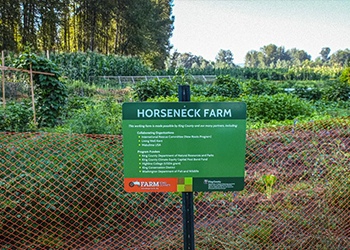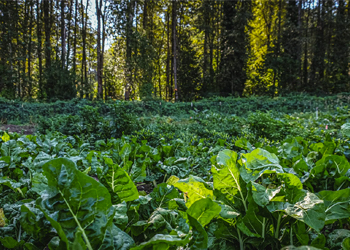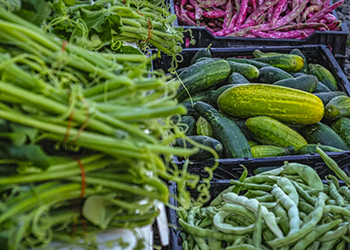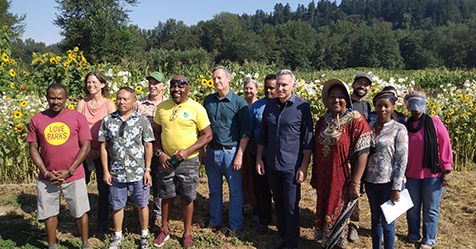Highline’s Sustainable Agriculture Program Manager Bobby Butler is leading a project with five community partners at Horseneck Farm with the goal to support and grow the number of immigrant and refugee farm businesses in King County. A three-year grant of just under $600,000 will provide business training and technical assistance to farmers in the program in order to address local priorities outlined in King County’s Local Food Initiative and Equity and Social Justice Initiative and meet the demand for beginning farmer training in South King County, fulfilling national priorities defined in the 2018 Farm Bill.
Read about this work in the following story, originally published Sept. 1 on Keeping King County Green, the blog of the King County Department of Natural Resources and Parks.
This story is shared with permission from kingcountygreen.com.
Horseneck Farm – King County land conservation brings refugee farmers back to the soil so better lives can be grown
Growing Swiss chard, cucumbers, tomatoes, amaranth, eggplant, and more on a small plot of rich soil at Horseneck Farm along the Green River in Kent means more than a bounty of healthy produce that closely matches the food war refugee Beatrice remembers growing and eating as a young person in her native Burundi.
“Here I am learning how to grow food in America, and learning about marketing food,” she said. “If I succeed in those, and if I can get the income from farming that I get from my other job, then I would quit that job and only do farming.”
Beatrice shared her story with King County Executive Dow Constantine, who recently visited a collection of small-scale farm plots at Horseneck Farm near Kent that was saved from development almost four decades ago through the County’s landmark Farmland Preservation Program.

Horseneck Farm is 13 acres of farmland located west of North Green River Park and East of East Valley Highway in Kent, WA.
King County is gradually transferring small portions of Horseneck Farm from a single corporate farm with limited crop variety to small-scale farmers who grow a more diverse selection of culturally relevant food to feed their families and to sell at farmers markets across South King County – among the nation’s most racially and culturally diverse areas.
“This is an exciting innovation,” said Executive Constantine. “It’s a way in which we in King County are living out our creed, our true north, that we will make this a welcoming community where every person can thrive.”
It’s the kind of strategic investment Executive Constantine wants to replicate elsewhere in King County by sustaining an accelerated pace of land conservation for farming, for fish and wildlife habitat, and for outdoor recreation. The King County Council approved his proposal for the November ballot that would restore local conservation funding to its original rate to protect more farmland, forests, natural lands, and greenspace – before it’s lost forever.
More than a dozen farmers grow crops on this farmland owned by King County, which partnered with a network of South King County organizations – International Rescue Committee’s New Roots Program, Living Well Kent, Wakulima USA, and Highline College – to make it more accessible to underserved communities.

While many of the small-plot farmers at Horseneck Farm are new to this land, none are new to farming. Once working the soil of Malawi, Zambia, and Nepal, they now tend their crops side by side on a small portion of the farm.
“Almost all of the farmers are immigrants who farmed in their home country,” said Melissa Borsting, DNRP Agricultural Land Use Coordinator. “Many now live in apartments or small spaces without enough land to grow significant amounts of food, and with high prices and limited access to land in King County, it’s nearly impossible to find farm-sized space,” she said.
“This project is addressing that need and providing an opportunity for people to establish a business that they’re dreaming of creating here in King County,” Borsting said.
Amanda, who sells some of her produce, donates some to a local food bank, and keeps some for herself, says the lease agreement to provide small plots of land for her and other small-scale farmers came as a relief.
Amanda, who grew up farming in her native Zambia before coming to the United States in 1999, enjoys growing vegetables from her homeland, including corn, sugar cane. This year’s variety of produce includes something special: Pumpkins grown from seeds given to her by her grandmother in Zambia.
“I visited my grandmother on her farm and decided to bring some seeds back because the pumpkins here are different than the ones we had back home, and it would be nice to have a piece of home here,” she said.
“I had been growing vegetables on my balcony and I was speaking to my friend about how frustrated I was that I didn’t have somewhere larger to grow,” Amanda said. Her neighbor knew about the new Horseneck Farm lease agreement, and now those Zambian pumpkins are growing in the fertile Green River Valley loam.
“I’m loving it. I really love it,” Amanda said of the farm. “I love seeing things grow. And I also enjoy seeing what other people are growing. There are plants that I didn’t know about that people from other countries grow and eat. So I’m learning.”
Thandiwe, from the southeastern African nation of Malawi, said working a plot at Horseneck Farm means enjoying fresh and healthy produce.
“We are all are immigrants working here, and everyone has planted crops from their own countries,” she said, noting that kale, cabbage, pumpkins, beans, corn are among the vegetables she’s growing this year. “We don’t even bother to go to the supermarkets anymore to buy vegetables. And the vegetables we grow are organic. We don’t apply fertilizers and we don’t spray pesticides.”
Working a plot close by to Thandiwe, Beatrice says she sees a future where others from her community could benefit from farming.

“We have seniors who are at home, they don’t know English, but they know how to use their hands on the farm,” she said. “So if I have two or three acres of land, I can hire those seniors, and they can come here and work, and be happy.”
Many immigrants and refugees have limited credit histories and no history of land ownership, making it difficult to start a farm business. King County’s partnership with nonprofits creates more opportunities for people who are experienced, talented farmers to succeed as new Americans.
“One of the really challenging things for anyone farming in King County is that land costs are very expensive and there’s a lot of pressure to transform those lands into other kinds of uses, such as residential or commercial developments,” said Heather Ramsay Ahndan, King County Land Conservation Initiative program manager. “We can help support established farmers by acquiring expensive land easements and protecting that farmland in perpetuity, and on the few farm properties we own outright we can help support new farmers getting started.”
Farmers consistently tell King County staff that the biggest barrier to success is access to adequate and affordable farmland. Farmland in King County frequently sells for about $30,000 per acre while the average cost of farmland across the United States is less than $4,000 per acre.
It has been 40 years since the voter-approved King County Farmland Preservation Program was used to save Horseneck Farm from development pressure, making it economically feasible for irreplaceable farmland to continue its vital role of growing food for growing communities.
Voter-approved measures continued to protect King County’s richest farmlands, most fragile ecosystems, and iconic landscapes, providing jobs, recreation opportunities and irreplaceable habitat for fish and wildlife.
Land conservation in King County – and 13 other counties – is largely funded by the Conservation Futures program created by Washington state 50 years ago, however the amount of revenue being generated by the program has been significantly reduced over the years.
“For us to have opportunities like this, to have agriculture, to have food security, to have the chance for newly arrived Americans to make a living farming and selling produce to a population of millions, we have to set aside the land. The market is not going to do this by itself,” Executive Constantine said at the end of his tour.
“That’s why the preservation funds we’ve set up over the years have been so critical. The farmlands preservation ordinance helped save this farm many decades ago. The Conservation Futures Fund that was set up about the same time, that we use to preserve forests and farmland, that has been eroded over years and that is why I proposed that this year it be restored to its original rate so that we can save the places that need saving before it’s too late.”
Voters in King County have the option this November to restore the local program to its original rate of 6.25 cents per $1,000 of assessed property value from its current rate of 3.12 cents. That would cost the owner of a median-value home about $21.75 more per year.


